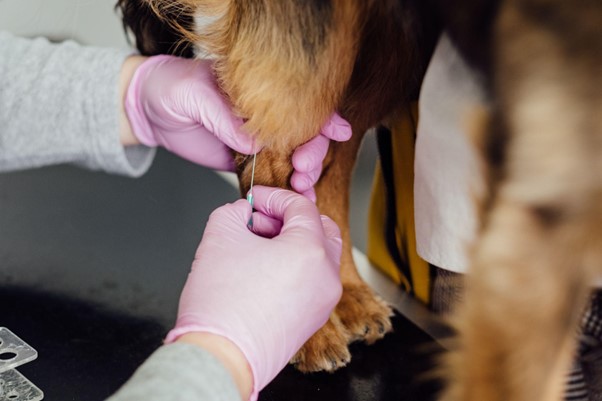Humans have been breeding dogs for thousands of years. Thanks to generations of breeding programs, we now have hundreds of dog breeds to suit every possible owner and role that the dogs must play. However, becoming a registered dog breeder is not just a matter of pairing two dogs together and then seeing what the outcome will be. Ethical dog breeding involves a significant amount of planning – after all, owning a dog is a significant responsibility that starts as soon as the dog is born.

There are also a variety of genetic tests that can be conducted in order to ensure the health and wellness of both the mother and father as well as their offspring. These tests can identify potential risks or diseases that may be passed down through generations, allowing breeders to make informed decisions about which pairings are safe and which should be avoided. There are several different types of tests that help assess a dog’s overall health, as well as their suitability for breeding.
Inherited Disease Tests
One of the most important genetic tests conducted when breeding dogs is one that checks for inherited diseases. Certain breeds are prone to certain illnesses and conditions, such as hip dysplasia or retinal atrophy. By testing for these diseases before mating two dogs, breeders can help to avoid producing puppies with serious health problems.
This type of test typically involves taking a small blood sample from each parent-dog and sending it off to an accredited laboratory for analysis. The results will reveal whether either parent carries any genes associated with an affected condition. Examples of these tests include hip dysplasia screening, patellar luxation screening (for kneecap issues), elbow dysplasia screening (for elbow abnormalities) and eye diseases such as progressive retinal atrophy (PRA).
Coat Color Tests
Another type of genetic test used in dog breeding is one that assesses coat colour. Different breeds tend to have specific colours associated with them and by testing the parents’ DNA, breeders can predict what colour their puppies might be born with.
For instance, if a breeder has two yellow Labrador retrievers but wants to breed chocolate Labradors, they could use this type of test to determine whether either parent carries the gene responsible for producing chocolate-colored fur before making any decisions on mating them together. This test is also useful when trying to produce certain coat patterns like merle or brindle markings in a litter of puppies.
Genetic Diversity Tests
Finally, some breeders opt to perform what’s known as a “genetic diversity” test prior to mating two dogs together. This type of test looks at how closely related two potential parents are by checking their DNA against each other and against other individuals in the same breed or kennel club registry database. If two potential parents have too much shared DNA (meaning they’re too closely related), there’s an increased risk of inheriting harmful genetic mutations from both parents at once instead of just one; this could lead to serious health issues in the offspring down the line.
By conducting this type of test before deciding on which pairings will occur, breeders can help reduce this risk significantly while still producing high-quality puppies with desirable traits.
Pedigree Analysis Tests
Finally, pedigree analysis is often used by breeders when evaluating prospective litters and individual puppies within them. By studying the family tree of both parent dogs, breeders can gain an understanding of what traits each puppy might inherit based on their lineage. While pedigree analysis cannot guarantee specific outcomes in terms of physical characteristics or behaviour traits, it does allow breeders to make informed decisions regarding which puppies have better chances at becoming well-adjusted adults with desirable traits down the line – ultimately leading to healthier litters overall.
Genetic testing plays an essential role when it comes to producing healthy puppies with desirable traits that people want in their canine companions – whether it’s a loyal family pet or working dog bred for competition purposes. No matter what tests you decide to run on your animals, it’s important to remember that none will guarantee perfect results – but they do provide invaluable information which can help you reduce the likelihood of producing puppies with serious inherited health conditions while improving overall breed quality over time.
From identifying potential inherited health issues before they become problematic all the way through analysing pedigrees for desirable traits – genetic testing helps create more informed breeding programs with healthier results.
